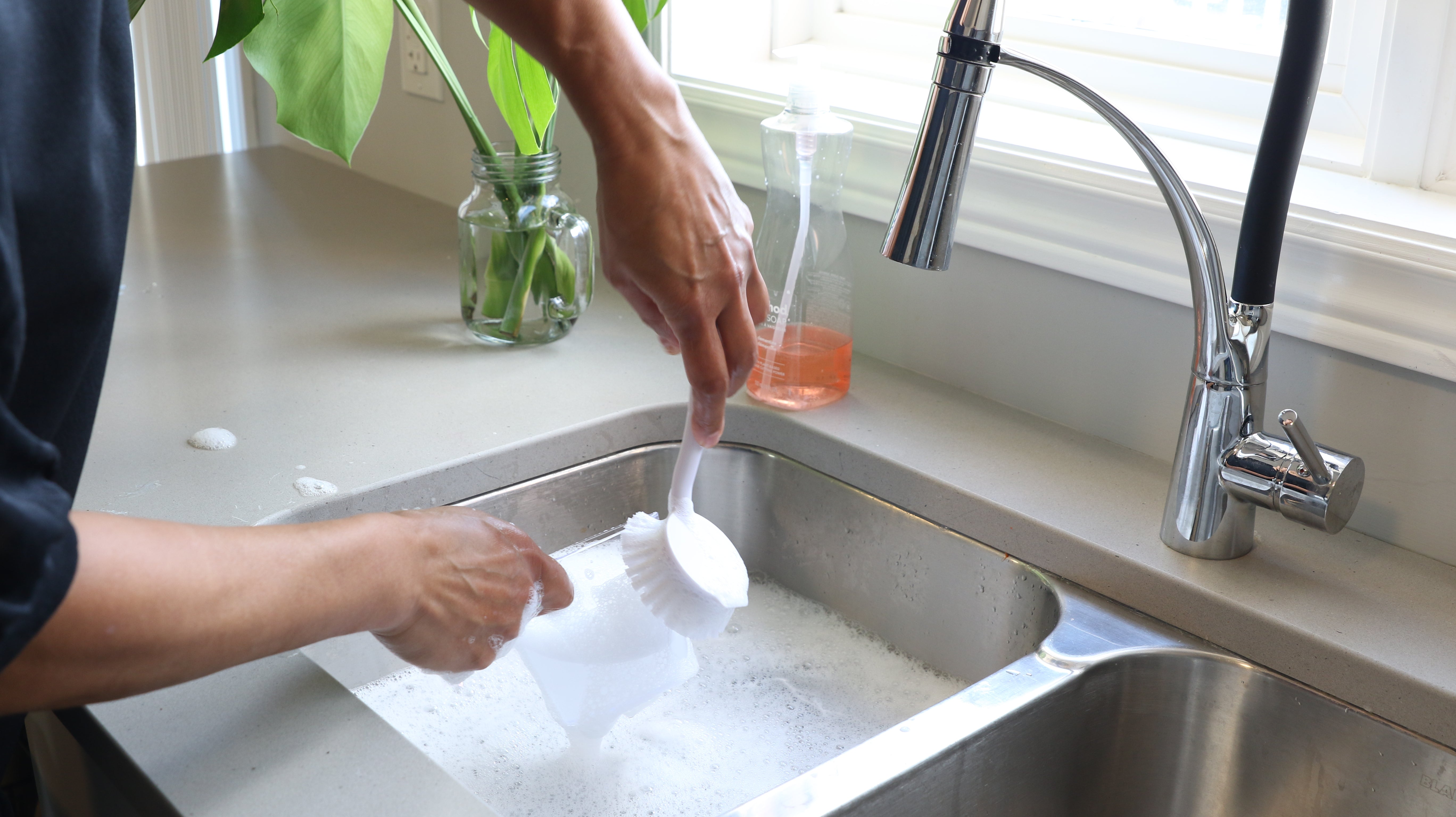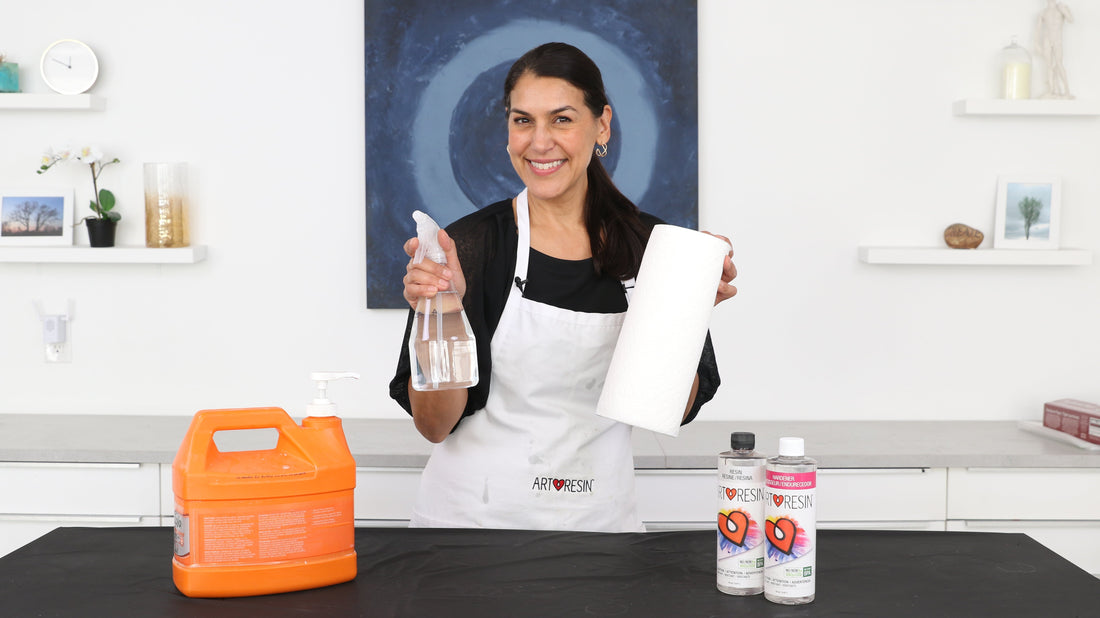Working with epoxy resin can be sticky. A few simple steps before you start pouring will help to ensure your tools, work space, hands and clothes stay clean. We're sharing our top tips on:
- how to keep your clothes and hair clean
- how to protect your work surface
- how to clean your resin tools and mixing containers
- how to clean resin off of your skin
- how to remove resin drips from the back of your artwork
- how to clean up resin spills, both wet and cured
- how to properly dispose of leftover resin and resin bottles
Let's get started!
1. Keep Your Skin, Clothes & Hair Clean:
Resin is sticky so always wear gloves when you’re handling resin or resin bottles and when you're cleaning up. Gloves will protect your hands from a sticky mess and possible skin irritation. Have multiple pairs of gloves on hand and replace them often - clean gloves will prevent your work environment from getting covered in resin.

Protect your clothing by wearing an apron or old clothes while you work: resin is very difficult to remove from clothing, and this includes your footwear - wear a pair of disposable protectors or an old pair of shoes you don't mind getting resin drips on.
If you have long hair, throw it up in a ponytail to keep the resin out of your hair and your hair out of the resin.
2. Protect Your Work Surface
Protect your work surface from resin drips or spills with a plastic liner. We like using a clear, smooth vinyl shower curtain because it’s inexpensive, sturdy and can be used over and over again. Plastic drop sheets or pieces of cardboard laid on the floor will protect against unwanted resin drips. It's a good idea to keep a roll of paper towel and alcohol in a spray bottle close by for cleaning up accidental spills.
For smaller projects, kitchen parchment paper works very nicely. The next day, cured resin drips and tools peel off with ease. Learn more about how to prepare your surface in our blog Surface Preparation Before Applying Epoxy Resin.
Learn more about how to prepare your surface in our blog Surface Preparation Before Applying Epoxy Resin.
3. Cleaning Up Tools
From stir sticks to spreaders to plastic drop sheets, we recommend using plastic tools when working with resin. Epoxy resin doesn't adhere to plastic which makes clean up a breeze (and who doesn't like easy clean up?) It also means you can use your tools over and over again.
 You have two choices when it comes to cleaning off plastic resin tools: first, remove as much resin as you can with paper towel.
You have two choices when it comes to cleaning off plastic resin tools: first, remove as much resin as you can with paper towel.
 Next, spritz wet tools with denatured alcohol to remove resin residue and wipe dry with paper towel. Repeat as often as necessary to remove all traces of resin.
Next, spritz wet tools with denatured alcohol to remove resin residue and wipe dry with paper towel. Repeat as often as necessary to remove all traces of resin.

When there is no more resin residue left, wash tools in hot soapy water and allow to dry thoroughly before using them again

The second method is to lay the wet tools on plastic or parchment overnight and allow the resin to cure. The next day, the resin will peel right off. This is our favorite method here at ArtResin - it's the easiest and requires no paper towel.

💡TIP: Be aware that resin doesn’t peel off of all plastic equally. It's much easier to peel resin from polypropylene plastic (this is the clouded plastic that has a little bend to it - many re-usable food containers are made of #5 polypropylene). 
 Plastics like acrylic will release the resin, but you may find some areas that stick and removing it takes a little more effort.
Plastics like acrylic will release the resin, but you may find some areas that stick and removing it takes a little more effort.
4. Cleaning Up Hands
The best way to keep your hands clean is to wear disposable gloves, changing them out for a clean pair as often as needed. We like using nitrile gloves here at ArtResin - they're strong, offer excellent chemical resistance and don't have the allergenic compounds often associated with latex. If you accidentally get resin on your skin, remove it immediately to prevent potential skin irritation. The best cleanser for removing resin from hands is one that contains an exfoliant. Orange hand cleaner from the hardware store works very nicely. ⚠️ IMPORTANT: Never use a solvent such as acetone, alcohol, or even vinegar to clean your hands. It breaks down resin and allows it to be absorbed by your skin.
If you accidentally get resin on your skin, remove it immediately to prevent potential skin irritation. The best cleanser for removing resin from hands is one that contains an exfoliant. Orange hand cleaner from the hardware store works very nicely. ⚠️ IMPORTANT: Never use a solvent such as acetone, alcohol, or even vinegar to clean your hands. It breaks down resin and allows it to be absorbed by your skin.

You can create your own scrub by combining a small amount of poppyseeds or coarse salt in your hands with some liquid dish soap. Rub over your hands until all traces of resin are gone, then rinse under warm water.


Read how to clean resin from your hands.
5. Cleaning Up Cured Resin Drips
The best way to avoid unwanted drips on the back of your artwork is to tape off the bottom of your piece with good quality painter's tape. As gravity pulls the resin down the sides, drips will start to accumulate along the bottom. The tape will catch these drips and once the resin is dry to the touch, pull the tape off and the drips right along with it.

What happens if you want to get rid of drips and you haven't used tape?
At the 24 hour mark, the resin will be dry to the touch but still flexible and you'll be able to flick them off with a utility knife.
⚠️ Exercise caution using this method: always ensure the blade is pointed away from you; don't attempt to remove fully cured resin drips with a blade.
After the 24 hour mark, resin will start to harden up: use a heat gun to soften the resin, running a metal scraper along the perimeter to remove drips.
You can also use a sander or a Dremel tool to remove cured resin drips.
⚠️ IMPORTANT: always wear a mask while sanding resin to avoid breathing in sanding dust.
6. Cleaning Up Spills
From time to time, accidents happen and you may need to clean up resin spills on the floor or your work surface.
It's much easier to remove resin while it's still wet. You can pour sand or kitty litter on spills, scraping up as much as possible, followed up with acetone or alcohol to break down any remaining residue.


If the resin has already cured, your best bet is to use a heat gun to soften the resin while gently pulling it up with a scraping tool. You can also try soaking it with alcohol or acetone to break it down before scraping it up with a razor or scraping tool.
⚠️ Be aware that either method may end up damaging the surface that the resin is stuck to.
7. Safe Disposal Of Resin Bottles
⚠️ PLEASE NOTE: Don't ever pour leftover epoxy resin down the drain. If you have a small amount of leftover resin and hardener in your bottles, you have a few options. If you plan to continue resining, you can drain the contents of the old bottles into newer bottles by either stacking the bottles on top of one another or by using a funnel. Once drained, the empty bottles can go into the recycling (check regulations with your local region.)



If you don't have a use for the leftover resin, please don’t dispose of it in its liquid state. Best bet is to cure the resin and hardener together and dispose of the solid resin in the trash. 
Please leave any questions or tips you'd like to share in the comments below!
Do you want to learn more about the epoxy resin cleaning process? Read our guides below:
- How To Clean Epoxy Resin Containers & Cups
- How To Clean Epoxy Resin Artwork
- How To Clean Cured Resin
- How To Clean Resin From Your Hands
ArtResin: The Original Epoxy For Resin Art.


